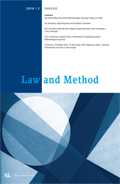|
In some scientific fields, such as the medical and social sciences, systematic literature reviews are frequently conducted. A systematic search for literature minimizes the risk of overlooking information or drawing conclusions based on an incomplete overview. This article focuses on a type of systematic literature reviews, the scoping review method, that may be of interest to legal scholars. This method can be used to answer an exploratory research question aimed at identifying important concepts or knowledge gaps by systematically searching, selecting and synthesizing literature. In seven steps, following the PRISMA guideline, the scoping review method is outlined. Concrete examples are outlined using a case example: a scoping review on divorce-related relocations in the context of doctoral research at the Vrije Universiteit Amsterdam. |


Law and Method
About this journalSubscribe to the email alerts for this journal here to receive notifications when a new issue is at your disposal.
| Artikel |
|
| Keywords | Scoping review, systematisch literatuuronderzoek, rechtsgeleerdheid |
| Authors | Loran Kostense |
| AbstractAuthor's information |
| Artikel |
|
| Keywords | Roman dictatorship, crisis government, emergency powers, legal historical research |
| Authors | Lukas van den Berge |
| AbstractAuthor's information |
|
Doctrinal approaches to Roman law are currently often supplemented by contextual legal-historical scholarship that aims to expose Roman law’s connections with its socio-political, religious and broader intellectual environment. This article draws attention to the relevance of such contextual research for modern legal problems. An analysis of the Roman dictatorship and its reception history in legal and constitutional scholarship serves as a case in point. Contrary to common belief, the far-reaching powers of the Roman dictator – acting to save the Roman Republic in times of great peril – were controlled by informal rather than formal legal restraints. A corrected understanding of the Roman dictatorship is arguably not only important for an appropriate assessment of the Roman constitution itself but also for current debates on the limits of legality in times of emergency. |

 Issue 11
Issue 11